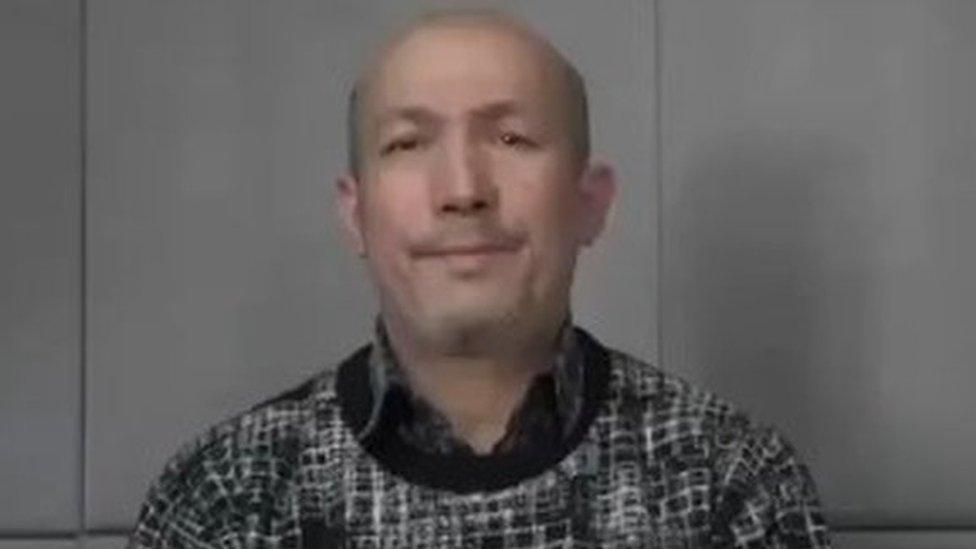Abdurehim Heyit Chinese video 'disproves Uighur musician's death'
- Published

A screenshot of the footage appearing to show Mr Heyit
Chinese state media have released a video appearing to show a Uighur musician previously reported to have died in a detention camp.
The video, dated 10 February, features a man said to be Abdurehim Heyit stating that he is in "good health".
Turkey earlier called on China to close the camps following reports of his death. Up to a million Uighurs are reportedly being detained.
Some Uighurs have questioned the video's authenticity.
Nury Turkel, chairman of the US-based Uyghur Human Rights Project, told the BBC that some aspects of the video were "suspicious".
The Uighurs are a Muslim Turkic-speaking minority based in the north-western Xinjiang region of China, which has come under intense surveillance by Chinese authorities. Their language is close to Turkish and a significant number of Uighurs have fled to Turkey from China in recent years.
What is in the video?
The video was released by China Radio International's Turkish-language service, which said Turkey's criticism of China was unfounded.
Allow X content?
This article contains content provided by X. We ask for your permission before anything is loaded, as they may be using cookies and other technologies. You may want to read X’s cookie policy, external and privacy policy, external before accepting. To view this content choose ‘accept and continue’.

In it, Mr Heyit appears to say he is "in the process of being investigated for allegedly violating national laws".
China has called on Turkey to retract its "false accusations".
"We hope the relevant Turkish persons can distinguish between right and wrong and correct their mistakes," foreign ministry spokeswoman Hua Chunying told reporters.
What did Turkey say?
Its foreign ministry had said that detained Uighurs were being subjected to "torture" in "concentration camps".
Foreign ministry spokesman Hami Aksoy said the reports of Mr Heyit's death "further strengthened the Turkish public's reaction to the serious human rights violations in Xinjiang", external.
"The reintroduction of concentration camps in the 21st Century and the systematic assimilation policy of Chinese authorities against the Uighur Turks is a great embarrassment for humanity," Mr Aksoy said.
He called on UN Secretary General Antonio Guterres "to take effective steps to end the human tragedy" there.
China has described the comments as "completely unacceptable".

Turkey's strategic blunder?
By John Sudworth, BBC News, Beijing
Critics have long seen Turkey's silence over the plight of China's Uighurs as a strategic blunder, undermining President Recep Tayyip Erdogan's lofty claim to moral leadership of the Muslim world.
But belatedly basing its condemnation of China's system of internment camps on a wrongful claim of a death in custody might be seen as an even bigger blunder.
That is certainly the view of China's foreign ministry. "The video clip has provided very good evidence for the truth," the ministry's spokeswoman said.
In reality it's impossible to verify anything about the status of Abdurahim Heyit. Before the claims of the musician's death, and China's quick rebuttal, there had been no official word about his detention at all.
Like hundreds of thousands of Uighurs, he had simply disappeared into a legal black hole.
And the video bears all the hallmarks of the forced, televised confessions regularly produced by the combined efforts of China's Communist Party controlled courts, police investigators and state-run media.
China has been quick to claim that the reports of Mr Heyit's death prove that much of the criticism of the situation in Xinjiang is based on falsehoods.
But critics will continue to argue that the confusion - stemming from the lack of any independent scrutiny - shows precisely why there's such growing concern, even, finally, in Turkey.

China's hidden camps


How unusual is the Turkish stance?
So far few Muslim-majority countries have joined in public international condemnation of the allegations. Analysts say many fear political and economic retaliation from China.
However Mr Turkel said the release of the video showed that the Chinese government did respond to public pressure.
"The Chinese government responds to Turkey because of the influence it has in the Muslim world," he said, adding that UN Secretary General Antonio Guterres had been "awfully quiet" on the issue of detentions in Xinjiang.
"The ball is in the Chinese government's court. They detained Heyit. They detained 10% of the Uighur population. They are trying to tell the world there is no abuse and these are just so-called vocational training centres. It's their responsibility to prove the video is authentic," he said.
Mr Turkel said the Chinese government was capable of doctoring video because of the "technological advantages it has".
"With today's technology it is possible to create a video presentation. It's not that difficult," he said.
What do we know about Heyit's fate?
Amnesty International has said it is very concerned about reports of his death.
He was a celebrated player of the Dutar, a two-stringed instrument that is notoriously hard to master. At one time, he was venerated across China. He studied music in Beijing and later performed with national arts troupes.
Mr Heyit's detention reportedly stemmed from a song he had performed titled Fathers. It takes its lyrics from a Uighur poem calling on younger generations to respect the sacrifices of those before them.
But three words in the lyrics - "martyrs of war" - apparently led Chinese authorities to conclude that Mr Heyit presented a terrorist threat.
Who are the Uighurs?
The Uighurs make up about 45% of the population in Xinjiang.
John Sudworth reports from Xinjiang, where one million Uighurs have reportedly been detained
They see themselves as culturally and ethnically close to Central Asian nations.
In recent decades, large numbers of Han Chinese (China's ethnic majority) have migrated to Xinjiang, and the Uighurs feel their culture and livelihoods are under threat.
Xinjiang is officially designated as an autonomous region within China, like Tibet to its south.